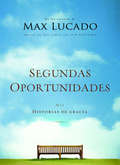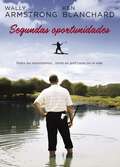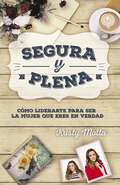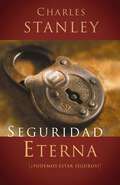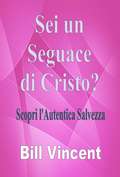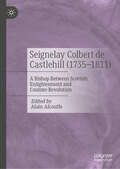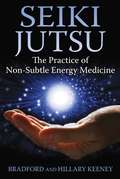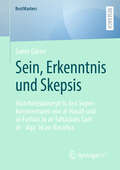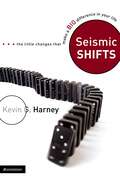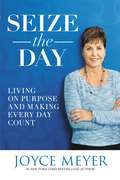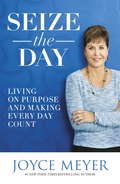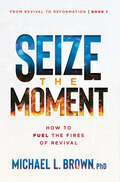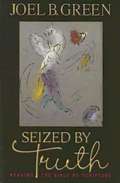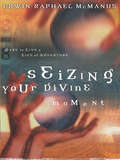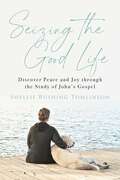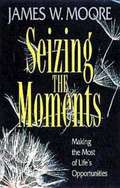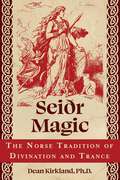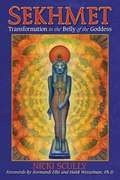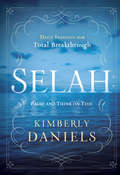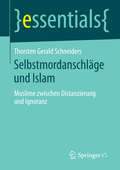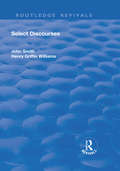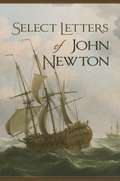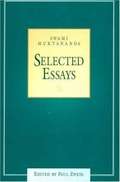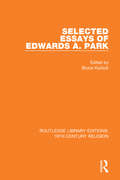- Table View
- List View
Segundas oportunidades
by Max LucadoNosotros los humanos somos propensos al fracaso. Somos expertos en enredar, revolver y estropear nuestras vidas. ¿Quién de nosotros no ha mirado hacia arriba desde el fondo de un hoyo y se ha dado cuenta de que lo ha cavado por sí mismo? ¿Quién no ha caído tan hondo y ha echado a perder las cosas de tal manera que ha llegado a pensar que no había esperanza? Es en estos momentos de desaliento cuando anhelamos un recordatorio de que hay esperanza para los quebrantados.Ningún recordatorio es tan conmovedor como una historia que hable de segundas oportunidades. Una historia de gracia en acción. ¿A cuántos no les servirían más historias como estas?Segundas oportunidades está lleno de relatos bíblicos, contemporáneos y de ficción extraídos de las obras publicadas de Max Lucado, donde se observa la gracia de Dios en acción, e incluye historias sobre nuevas oportunidades para aquellas personas propensas al fracaso, llenas de rebeldía, orgullo y otras condiciones. Desde Pedro hasta el rey David, pasando por una hija pródiga, estas historias les recordarán a los lectores la magnitud del evangelio sobre segundas oportunidades. We humans are prone to failure. We're experts at muddying, mixing, and messing up our lives. Who among us hasn't looked up from the bottom of a pit and realized he dug it himself? And it's at these low points that we crave reminders that there's hope for the broken.
Segundas oportunidades: Más historias de gracia
by Wally ArmstrongEl mulligan. El perdón generoso del golf. Un rehacer. ¿No sería genial ser capaz de tomar un mulligan en la vida? ¿Rehacer algunas de las decisiones que ya hemos tomado? ¿Tener una segunda oportunidad? Este libro es una inspiración a tomar un mulligan, a reconsiderar los intentos de esta vida y a obtener una segunda oportunidad sobre aquellos intentos que fracasamos. Este volumen sencillo y corto presenta a Ken Blanchard en lo suyo, lleno de sabiduría y consejo tan práctico como perspicaz que puede cambiar la forma de ver todas las cosas. Esta es una historia conmovedora de segundas oportunidades en la vida y en el golf , escrita con un estilo atractivo en forma de parábola, tal como los éxitos de librería Who Moved My Cheese?, Gung Ho!, Fish! y Whale Done! Bajo la tutoría de un profesional, un obstinado Paul McAllister aprende, dondequiera que esté, sobre prioridades, autoestima, segundas oportunidades en los intentos que fracasamos y sobre aquello que se necesita para jugar un buen juego, tanto en el golf como en la vida.
Segura y plena: Cómo liderarte para ser la mujer que eres en verdad
by Kristy MottaLas mujeres anhelamos sentirnos seguras y disfrutar una vida en plenitud, pero primero necesitamos conocer nuestra identidad, nuestras fortalezas y debilidades para poder dirigirnos hacia donde queremos llegar. El propósito de este libro es que las mujeres adquieran el conocimiento liberador que les permita generar nuevas creencias y valores; modificando así su comprensión de sí mismas de tal manera que desarrollen las habilidades necesarias para autoliderarse y liberarse para «ser y hacer» en un equilibrio saludable que potenciará sus relaciones y también su influencia.
Seguridad eterna
by Charles F. StanleyExplica por qué el creyente puede sentirse seguro de su salvación.
Sei un Seguace di Cristo?: Scopri l'Autentica Salvezza
by Bill VincentBill Vincent si è emozionato per la parola. Il fuoco di Dio sta per cadere. Vuole dirvi che ogni ritorno alla religione in cui non venga predicato alcun Vangelo, non è affatto un risveglio religioso. Bill desidera darvi un messaggio che chiama Sei un Seguace di Cristo. Sei un seguace? In Matteo 25:1 la Bibbia dice: “Allora il regno de’ cieli sarà simile a dieci vergini le quali, prese le loro lampade, uscirono a incontrar lo sposo. E sulla mezzanotte si levò un grido: Ecco lo sposo, uscitegli incontro!”
Seignelay Colbert de Castlehill (1735-1811): A Bishop Between Scottish Enlightenment and Counter-Revolution
by Alain AlcouffeThis book brings together its contributors to study the figure of Seignelay Colbert de Castlehill, born in Inverness on 13th August 1735 into a Presbyterian family and who died in London, an anti-Concordant bishop and leader of the ‘Little Church’ on 15th July 1811. Vicar general of Loménie de Brienne in Toulouse, frequenting the Parisian salons, he was the guide of the economist Adam Smith in Toulouse and in the Southwest, from Bordeaux to Montpellier, from March 1764 to October 1765. In 1782, he was elevated to the episcopal see of Rodez and became president of the provincial assembly of Haute-Guyenne. As a representative of the clergy of Rouergue in 1789, he was one of the French bishops who rallied to the Third Estate, allowing the Estates-General to become the National Assembly. He has however escaped the prosopography of the French Revolution, as well as Scottish historiography.
Seiki Jutsu: The Practice of Non-Subtle Energy Medicine
by Bradford Keeney Hillary KeeneyA guide to the ancient Japanese art of working with concentrated life-force energy, seiki, for self-healing, revitalization, and creativity • Explains how to awaken seiki, guiding you through the stages of seiki development • Details how to develop your own daily practice for self-healing and renewal as well as providing exercises to infuse your everyday activities with seiki • Includes many inspiring stories from the authors’ decades of healing work Seiki jutsu is the ancient Japanese shamanic art of working with seiki, concentrated life-force energy, for self-healing, revitalization, creativity, and inspiration. Known in Tantra as kundalini and to the Kalahari Bushmen as n/om, seiki has been called “activated and strengthened chi” and is often described as a “non-subtle” energy because it is strongly felt when awakened. Centering on spontaneity of movement to gather and transmit seiki, the practice of seiki jutsu does not require years of training or endless memorization of forms. Once you have received seiki, your daily practice will teach you to activate the flow of this powerful energy to recharge your body, mind, and spirit and empower you to find your unique destiny. Renowned seiki jutsu masters Bradford and Hillary Keeney detail the history and lineage of seiki jutsu beginning in 8th-century Japan and reveal how this ancient practice was used by the samurai. The authors show how seiki underlies the “flow experience” sought after by artists, musicians, athletes, and performers of all types. They explain how to recognize the awakening of seiki, guiding you through the stages of seiki development with stories of healings they have participated in or witnessed. They reveal how to develop your own daily practice for self-healing and renewal as well as provide active exercises to discover your life’s purpose, infuse your everyday activities with seiki, and motivate yourself to create a fulfilling life. They show that no method of performance, spiritual practice, or philosophy of life can fully awaken unless you are instilled with sufficient seiki. Regarded in Japan as “the fountain of youth,” seiki jutsu provides a way to bring maximum vitality into every aspect of life.
Sein, Erkenntnis und Skepsis: Wahrheitskonzept in den Superkommentaren von al-Ḫayālī und al-Farhārī zu at-Taftāzānīs Šarḥ al-ʿAqāʾid an-Nasafīya (BestMasters)
by Soner GörenDas Konzept der Wahrheit begründet das Fundament der Theologie (ʿilm al-kalām) im klassischen Islam. Deshalb beginnt die berühmte Glaubensabhandlung des an-Nasafī (gest. 1142) mit der Verteidigung des Wahrheitskonzeptes gegenüber den Sophisten. In diesem Buch werden der Kommentar des at-Taftāzānī (gest. 1390) und die beiden Superkommentare von al-Ḫayālī (gest. 1470) und al-Farhārī (gest. 1823) zur erwähnten Glaubensabhandlung im Hinblick auf wahrheitstheoretische Inhalte und Argumentationen untersucht. Indem die Autoren die Wahrheit als eine Korrespondenzrelation zwischen dem menschlichen Intellekt und der Wirklichkeit auf den Begriff bringen, argumentieren sie für die subjektunabhängige Existenz der Dinge und die Möglichkeit einer wirklichkeitsabbildenden Erkenntnis.
Seismic Shifts: The Little Changes That Make a Big Difference in Your Life
by Kevin G. HarneyIt’s easy to talk about changing your life. Here’s how to actually do it. If you long to experience transformation in the most significant areas of life, this book will become your road map. Seismic Shifts is about change—positive, quality change that can help you ? experience deep and lasting joy ? engage in a growing and dynamic relationship with God ? feel healthy, rested, and peaceful ? build intimate relationships marked by honest communication ? attain financial security and contentment ? enjoy sharing your faith naturally and consistently By making small adjustments in just the right places, you can set off a chain reaction that will redefine the landscape of your life. Dreams really do come true when you learn how to take little steps that make a big difference. Small changes can yield huge transformations in the most important areas of your life. My friend Kevin Harney shows you how in his inspiring and practical book. —Lee Strobel, author, The Case for Christ and The Case for a Creator Kevin Harney is both a gifted communicator and a seasoned pastor. Seismic Shifts will be a gift to individuals and churches alike. —John Ortberg, Teaching Pastor, Menlo Park Presbyterian Church and author of God Is Closer Than You Think and The Life You’ve Always Wanted Kevin Harney is totally on track with Seismic Shifts. With skillful pen, Kevin teaches us how to create powerful movement in our lives. —Randy Frazee, Teaching Pastor at Willow Creek Community Church and author of The Connecting Church and Making Room for Life
Seize the Day: Living on Purpose and Making Every Day Count
by Joyce Meyer#1 New York Times bestselling author Joyce Meyer shares a purposeful approach to everyday living, helping readers claim the good things God has in store for them each day. Today is no ordinary day. You may perform simple routines, feel uninspired, or lack the excitement of hope. But today could be the most important one of your life--depending on how you choose to spend it.Joyce Meyer, #1 New York Times bestselling author, encourages you not to waste another minute. There is something special, valuable waiting for you to discover in each day. And when you spend time with God daily, asking Him to help you find it, you'll unlock the wonderful purpose He has in store for you. When you commit to letting God direct you, instead of resting passively in your own disappointments, you'll be open to receive greater happiness and blessings than you ever thought possible.All you need is the right encouragement. With over four decades of experience helping others find fulfillment, Joyce shares key biblical insights and personal stories that will help you make the most of this moment and SEIZE THE DAY!
Seize the Day: Living on Purpose and Making Every Day Count
by Joyce MeyerToday is no ordinary day. You may perform simple routines, feel uninspired, or lack the excitement of hope. But today could be the most important one of your life -- depending on how you choose to spend it. Joyce Meyer encourages you not to waste another minute. There is something special, valuable waiting for you to discover in each day. And when you spend time with God daily, asking Him to help you find it, you'll unlock the wonderful purpose He has in store for you. When you commit to letting God direct you, instead of resting passively in your own disappointments, you'll be open to receive greater happiness and blessings than you ever thought possible. All you need is the right encouragement. With over four decades of experience helping others find fulfillment, Joyce shares key biblical insights and personal stories that will help you make the most of this moment and SEIZE THE DAY!
Seize the Moment: How to Fuel the Fires of Revival (From Revival to Reformation #1)
by Michael L. BrownRevival is dependent on how much we allow the Holy Spirit to move. After reading this book, you will have the confidence to share the good news of what the Holy Spirit is doing in our world with everyone who will listen. You will no longer sit on the sidelines, but rather you will partner with the Holy Spirit to do all that He has asked you to do. Respected theologian and Bible scholar Michael L. Brown, PhD, saw firsthand the impact of the long-running Brownsville Revival on the church and the nation. He believes another powerful move of God is on the horizon, and he doesn&’t want believers to miss or squander that moment. In Seize the Moment, Brown lays out twenty-five proven ways readers can cultivate and sustain revival so it becomes more than an emotional experience and changes their lives, communities, and nations. With insight gleaned from years of experience, Brown challenges readers to: make Jesus and the cross central reach the lost never downplay the importance of holiness steer clear of doctrinal weirdness keep the main thing the main thing and more For those who want to be a part of the next great move of God, Revival Rising is essential reading. It will show readers how to embrace revival with wisdom and discernment and avoid the pitfalls that can sabotage a move of God, safeguard the purity of revival, and cultivate an environment where God&’s presence dwells unhindered. Christians have been praying, fasting, and longing for revival for years. This practical and inspirational book will help them be ready for it when it comes. If readers apply Brown&’s wisdom, with the Spirit&’s help, instead of messing up a move of God they will enjoy the fruit of revival for many years to come.
Seized by Truth: Reading the Bible as Scripture
by Joel B. GreenWe read the Bible and interpret Scripture in order to live in grace-filled relation to God's divine purpose.When we approach the Bible as Scripture author, Joel Green, takes seriously the faith statement that the Bible is our Book; these scriptures are our Scripture. We are not reading someone else's mail--as though reading the Bible had to do foremost with recovering an ancient meaning intended for someone else and then translating its principles for use in our own lives. When we recall that we are the people of God to whom the Bible is addressed as Scripture, we realize that the fundamental transformation is not the transformation of an ancient message into a contemporary meaning, bur rather the transformation of our lives by means of God's Word. This means that reading the Bible as Scripture has less to do with what tools we bring to the task, however important these may be, and more to do with our own dispositions as we come to our engagement with Scripture. We come not so much to retrieve facts or to gain information, but to be formed and ultimately, transformed. Scripture does not present us with texts to be mastered but with a Word, God's Word, intent on mastering us, on shaping our lives.
Seizing Your Divine Moment
by Erwin Raphael McmanusIn this inspiring book, Erwin McManus uses the biblical account of Israel's war with the Philistines (1 Samuel 13 and 14) and the characters of Saul and Jonathan to demonstrate the difference between living a life of purpose and adventure, and living one of apathy and missed opportunity. In the midst of a less-than-hopeful battle, Saul-who should have been leading-rested beneath a pomegranate tree as Jonathan seized the divine moment that would impact the future of Israel. Through this story McManus artfully illustrates the eight characteristics of an adventurer's heart, what he calls "the Jonathan factor." Using powerful examples from his own life and ministry, along with fresh biblical teaching, McManus asserts that God crafts divine moments specific to each of us-priceless opportunities for us to actively engage in God's big-picture plan. Apathy and apprehension prevent us from being all we are meant to be for God's kingdom. But by developing the characteristics McManus outlines, Christians can move from mundane to miraculous living.
Seizing the Good Life: Discover Peace and Joy through the Study of John's Gospel
by Shellie Rushing TomlinsonLiving on high alert drains your energy and steals your joy. There is a better way and Seizing the Good Life will help you find it as it takes you through the Gospel of John.Shellie Rushing Tomlinson believes we really can have a growing faith and know a surprising, sustaining joy despite the chaos of breaking news and a culture bent on erasing the Everlasting God. Seizing the Good Life takes the Gospel of John and teaches the reader how to believe and keep believing in our post-Christian world. We&’re not meant to hold onto a dry faith with chewed- up fingernails. We can know peace and joy in the middle of our anxious and angry culture, and Seizing the Good Life is ready to lead the way! With the Gospel of John as her roadmap, Shellie invites readers to join her in a faith-building Bible study. Using personal stories, insights, relevant Scripture, and a sprinkling of humor, Seizing the Good Life will help the reader discover the peace and joy found in the friendship of Jesus, lover of their soul.
Seizing the Moments: Making the Most of Life's Opportunities
by James W. MooreBeloved author James W. Moore returns in the revival of his 1988 classic. Readers will appreciate Moore's distinctive style as he relates stories, anecdotes, and examples of people who learned to "seize moments" -- who turned opportunities and treasured moments into realized dreams. Each chapter features a related passage of Scripture. This edition also includes a study guide with questions ideal for personal reflection or for group discussion. Readers will discover encouragement and guidance for better living as they find themselves becoming more courageous, more willing to "seize the moments", and more aware of God's grace.
Seiðr Magic: The Norse Tradition of Divination and Trance
by Dean Kirkland• Explains the techniques used to achieve trance in seiðr, how to journey in the Nine Realms, and the different gods and spirits you may encounter • Discusses the tools of seiðr, such as the seiðr staff and hood, and how to create them, empower them, and care for them • Details Norse divination methods, ways to alter fate, healing techniques, the use of protective songs, and the practice of Norse soul retrieval While Norse rune work is well known, there is another major ancient Norse magical practice: seiðr (pronounced &“sayther&”), a form of trance spirit work and divination. Although seiðr is often considered an ancient form of witchcraft, recent archaeological evidence suggests it is more closely related to shamanism. In this practical guide to seiðr, Dean Kirkland, Ph.D., reconstructs the magical and shamanic techniques of the seiðr priest or priestess using the sagas and other literature from the Viking age, tools found in the archaeological record, and surviving indigenous shamanic traditions. He addresses the misconception that seiðr was a practice reserved only for women and shows how anyone called to this work would have been accepted in ancient Norse society. He discusses the tools of seiðr and how to create them, empower them, and care for them. He explores the use of protective songs (varðlokkur) that involve forming bonds with spirits, a practice he likens to the medicine songs of Amazonian shamans. He explains the techniques used to achieve trance in seiðr and how they are based on finding balance between the light and the darkness. Looking at trance journeying in the Nine Realms of the Norse cosmos, the author discusses the different gods and spirits the seiðr practitioner may encounter in the Upper Realms, the Middle Worlds, and the Lower Realms. He shares exercises on the Wyrd, divination methods in seiðr, as well as ways to alter Ørlög, or fate, through spiritual work. Discussing soul-healing techniques in seiðr, the author looks in depth at the Norse shamanic practices of soul retrieval and reintegration of the soul parts. He then explores seiðr&’s role in death, dying, and dealing with the dead, including work with the Valkries and the ancestors. Presenting a historically based handbook for contemporary heathens, this book offers a practical path for anyone seeking to explore Norse trance magic and mysticism.
Sekhmet: Transformation in the Belly of the Goddess
by Hank Wesselman Nicki Scully Normandi EllisA shamanic ritual with the Egyptian goddess Sekhmet to bring about alchemical transformation at the deepest levels of your being• Details how to work with Sekhmet to transform your negative behavior patterns and character flaws into creative impulses and higher energies• Leads you through guided visualizations, illustrated with photographs, to Sekhmet’s chapel at the Temple of Karnak and through her shamanic ritual of transformation• Includes initiations, rites of passage, and transmissions from Sekhmet to release your fears and anger and rejuvenate your body, mind, and spiritSekhmet is the lioness goddess of the Egyptian Pantheon, a fierce protector of truth, balance, and the Cosmic order of Ma’at. Known and feared as the goddess of war and destruction, she also represents the transformative power of kundalini energy, or sekhem, and is the main goddess to harness this power for healing. As “She Who Comes in Times of Chaos,” she takes offerings of fear, rage, and weakness and transforms them into alchemical gold, the universal medicine for physical, emotional, and soul healing.In this book you are guided through a shamanic ritual of alchemical transformation and initiation with Sekhmet, working with this powerful goddess to release your most deeply rooted negative behavior patterns and be reborn into a more purified state of consciousness. Using intensive self-examination exercises to help you prepare to meet the goddess, the author leads you through a guided visualization, illustrated with photographs, to an ancient statue of Sekhmet in her chapel at the Temple of Karnak. There, you will be shamanistically devoured by the goddess, directly experiencing the alchemical process of transformation in the belly of Sekhmet until you are rebirthed as a fully realized adult child of the goddess. You will experience how your offering of pain, fear, rage, and self-sabotage is digested, absorbed, and assimilated by Sekhmet while you are initiated into the alchemy of total transformation. The initiations, rites of passage, and transmissions from Sekhmet included in the journey restructure the most important aspects of your body, mind, spirit, and soul.This journey of shamanic death, illumination, and rebirth in the belly of Sekhmet provides an opportunity to heal on all levels and allows you to release your rage, anger, and fear as you transform the energies that maintained them into creative and constructive solutions that benefit yourself, your community, and the planet.
Selah: Daily Insights for Total Breakthrough
by Kimberly DanielsPause, be still, and find hope as you recognize that God is working on your behalf. Kimberly Daniels has overcome the adversity in her life and has been set free in many ways. She shares what she has learned so that it might equip other Christians to fight the fight and come out stronger on the other side. The Hebrew word Selah means “pause and think on this.” As you take time to pause and reflect on each day’s message, you will strengthen your spirit and arm yourself for spiritual battle. These powerful daily readings will encourage those who are in the midst of tough times. You will be equipped spiritually for breakthrough in every situation.
Selbstmordanschläge und Islam: Muslime zwischen Distanzierung und Ignoranz (essentials)
by Thorsten Gerald SchneidersDas Phänomen der Selbstmordattentäter ist historisch belegt und nicht auf bestimmte Religionen und Kulturen begrenzt. Trotzdem liegt der Fokus häufig auf Taten, die in einem islamischen Kontext verübt werden. Die zentralen Beweggründe für Selbstmordattentäter sind politischer Natur. Dass der religiöse Aspekt dennoch überhöht wird, liegt an dem Stereotyp, wonach der Islam besonders gewaltfördernd sei. Diese Darstellung wiederum führt bei Muslimen mitunter dazu, die religiöse Komponente solcher Gewaltakte zu ignorieren oder zu leugnen. Ein Zusammenhang zwischen Selbstmordattentaten und Islam ist aber nicht von der Hand zu weisen.
Select Discourses: Treating, 1. Of The True Way Or Method Of Attaining To Divine Knowledge, 2. Of Superstition, 3. Of Atheism, 4. Of The Immortality Of The Soul, 5. Of The Existence And Nature Of God (classic Reprint) (Routledge Revivals)
by John SmithPublished in 1978: this book contains the text of the Select Discourses of the author. The author covers a variety of religious topics in these essays, including superstition, atheism and the existence and nature of God.
Select Letters of John Newton
by John NewtonJohn Newton (1725-1807), sailor, preacher and hymnwriter, was one of the most colourful figures in the great Evangelical Revival of the 18th Century. Once an infidel and libertine, a servant of slaves in Africa, he wrote for his own epitaph, by the rich mercy of Jesus Christ, preserved, restored, pardoned, and appointed to preach the faith he had long laboured to destroy. It was through his correspondence that Newton fulfilled his distinctive work as the letter writer par excellence of the Evangelical Revival . His grasp of Scripture and deep personal experience, his many friends (among them, George Whitefield, William Cowper and William Wilberforce), his manifold trials, his country pastorate, his strong, clear, idiomatic style all these factors combined to prepare the author of How sweet the Name of Jesus sounds , for the exercise of his special gift. These practical letters cover a wide variety of subjects and aim to conform the believer to Christ.
Selected Discourses of Shenoute The Great
by Andrew Crislip Brakke, David and Crislip, Andrew David BrakkeShenoute the Great (c. 347–465) led one of the largest Christian monastic communities in late antique Egypt and was the greatest native writer of Coptic in history. For approximately eight decades, Shenoute led a federation of three monasteries and emerged as a Christian leader. His public sermons attracted crowds of clergy, monks, and lay people; he advised military and government officials; he worked to ensure that his followers would be faithful to orthodox Christian teaching; and he vigorously and violently opposed paganism and the oppressive treatment of the poor by the rich. This volume presents in translation a selection of his sermons and other orations. These works grant us access to the theology, rhetoric, moral teachings, spirituality, and social agenda of a powerful Christian leader during a period of great religious and social change in the later Roman Empire.
Selected Essays
by Swami Muktananda Paul ZweigResponding to his students' wishes, Swami Muktananda's series of talks and informal dialogues on spiritual practices and truths includes many of his favorite teaching stories.
Selected Essays of Edwards A. Park (Routledge Library Editions: 19th Century Religion #12)
by Bruce KuklickThis volume, originally published in 1987, includes several of Edwards A. Park’s influential essays and sermons, including Connection between Theological Study and Pulpit Eloquence, Duties of a Theologian and Unity Amid Diversities of Belief, Even on Imputed and Involuntary Sin. Edwards Amasa Park, an American Congregational theologian, was an able defender of Trinitarian views and became a figure of theological power in his denomination. This title will be of interest to students of nineteenth-century religious and social history.
